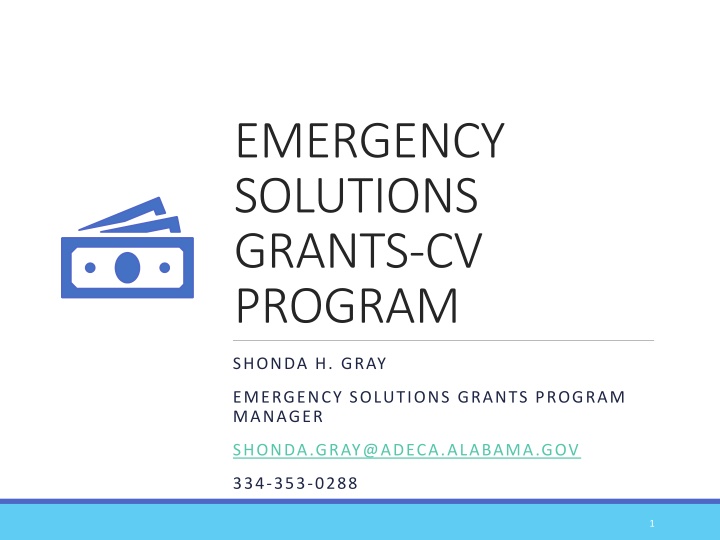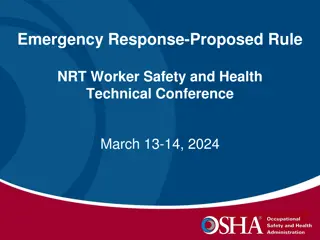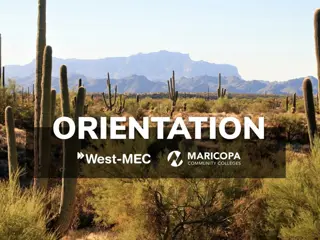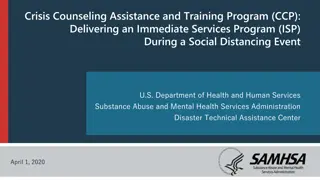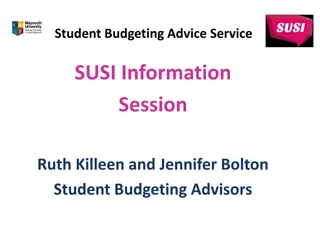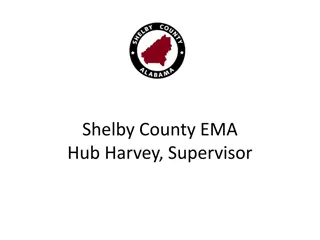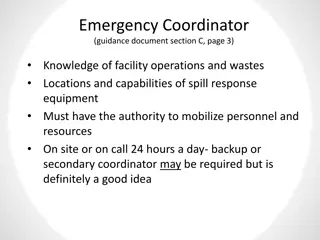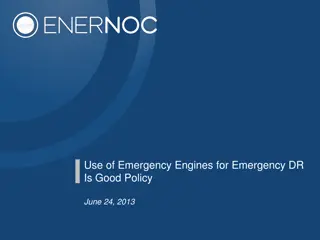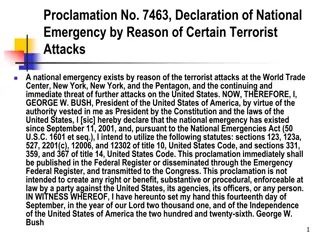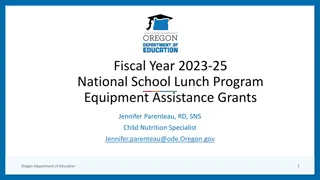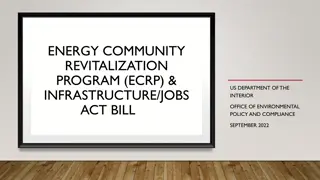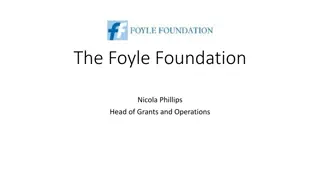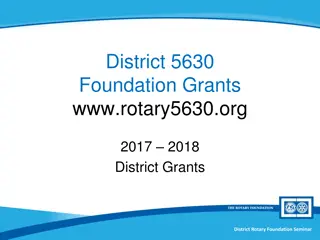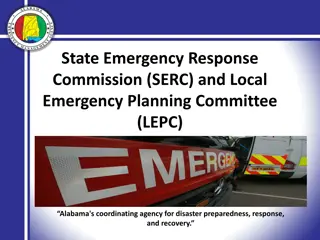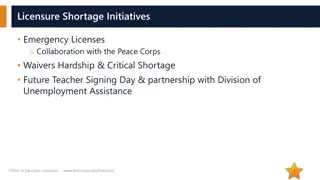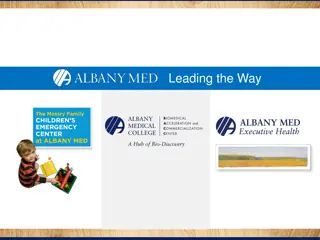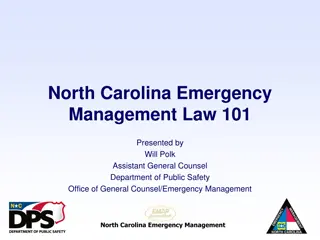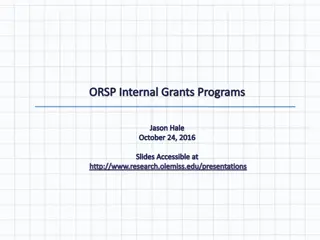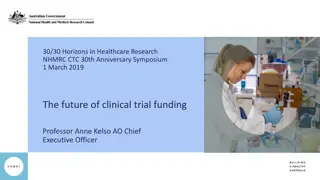Emergency Solutions Grants Program Information
This content provides essential details about the Emergency Solutions Grants (ESG) Program, including program manager contact information, fund allocations, eligible applicants, criteria for private nonprofit organizations, rules for faith-based organizations, and application thresholds.
Download Presentation

Please find below an Image/Link to download the presentation.
The content on the website is provided AS IS for your information and personal use only. It may not be sold, licensed, or shared on other websites without obtaining consent from the author.If you encounter any issues during the download, it is possible that the publisher has removed the file from their server.
You are allowed to download the files provided on this website for personal or commercial use, subject to the condition that they are used lawfully. All files are the property of their respective owners.
The content on the website is provided AS IS for your information and personal use only. It may not be sold, licensed, or shared on other websites without obtaining consent from the author.
E N D
Presentation Transcript
EMERGENCY SOLUTIONS GRANTS-CV PROGRAM SHONDA H. GRAY EMERGENCY SOLUTIONS GRANTS PROGRAM MANAGER SHONDA.GRAY@ADECA.ALABAMA.GOV 334-353-0288 1
Subject to: ESG Program Interim Rule at 24 CFR Part 576 except for the requirements specified in the CARES Act Notice CPD-20-08 Waivers and Alternative Requirements for the Emergency Solutions Grants (ESG) Program Under the CARES Act (ESG-CV Notice) ESG-CV PROGRAM 2
States allocations are $9,376,200 (round 1) and $13,860,804 (round 2) Funds will be allocated based on the quality of applications received Grant ceiling of $1,000,000 No Match Requirement DISTRIBUTION OF FUNDS 3
Local units of government: cities, towns, or counties Private nonprofit organizations ELIGIBLE APPLICANTS Faith-based organizations Public housing agencies Local redevelopment authorities 4
Must meet the following criteria: Is a secular or religious organization described in section 501 (c) of the Internal Revenue Code of 1986; Is exempt from taxation under subtitle A of the Code; Has an accounting system and a voluntary board; and Practices nondiscrimination in the provision of assistance PRIVATE NONPROFIT ORGANIZATION 5
FAITH-BASED ORGANIZATIONS Can t engage in religious activities as part of the ESG-CV funded activities Can t discriminate based on religion or religious beliefs Can t use ESG-CV funds to rehabilitate structures used for religious activities 6
Applications will not be accepted if applicant: Is indebted to the state or federal government and no repayment arrangement is in place Has disallowed costs resulting from an ADECA review or audit and no resolution is finalized APPLICATION THRESHOLDS 7
Applicant may not be listed as a second-tier subrecipient in another application. APPLICATION RESTRICTIONS NOTE: A second-tier subrecipient may be listed as a second-tier subrecipient in multiple applications. 8
USE OF ESG-CV FUNDS Prevent, Prepare For, and Respond to the Coronavirus Pandemic 9
PREVENT THE CORONAVIRUS Providing Personal Protective Equipment Paying for non-congregate shelter options (hotels & motels) Paying for handwashing stations and portable toilets (for people living in unsheltered situations) Providing homelessness prevention assistance Providing rapid re-housing assistance 10
PREPARE FOR THE CORONAVIRUS Updating written standards to prioritize people at severe risk of contracting the coronavirus for shelter and housing Adapting coordinated entry policies and procedures to account for social distancing measures or increased demand Developing a strategy and recruiting landlords to house homeless persons or those at risk of homelessness 11
PREPARE FOR THE CORONAVIRUS Training homeless services providers on infectious disease prevention and mitigation Implementing a non-congregate shelter strategy to reduce the spread of the coronavirus 12
RESPOND TO CORONAVIRUS Transporting persons experiencing homelessness to medical appointments Paying for shelter to isolate COVID-19 positive patients from other program participants and persons experiencing homelessness Providing rental assistance Providing hazard pay 13
Street Outreach Emergency Shelter ELIGIBLE ACTIVITIES Temporary Emergency Shelter Homelessness Prevention 14
Rapid Re-Housing ELIGIBLE ACTIVITIES Homeless Management Information System (HMIS) Administration 15
UNIQUE ACTIVITIES Hazard Pay paid to staff working directly to prevent, prepare for, and respond to coronavirus among homeless persons or those at risk of homelessness Training funds may be used for training on infectious disease prevention and mitigation for staff working directly to prevent, prepare for, and respond to coronavirus among persons who are homeless or at risk of homelessness 16
UNIQUE ACTIVITIES Landlord Incentives may be provided if reasonable and necessary to obtain housing for persons experiencing homelessness or at risk of homelessness Volunteer Incentives reasonable incentives may be provided to volunteers who have been and are currently helping to provide necessary street outreach, emergency shelter, essential services, and housing relocation and stabilization services during the coronavirus outbreak 17
Assistance provided must serve unsheltered homeless persons who are neither willing nor able to access housing, emergency shelter, or an appropriate health facility. STREET OUTREACH 18
Eligible costs include: Engagement Case Management Emergency Health Services Emergency Mental Health Services Transportation STREET OUTREACH ELIGIBLE COSTS 19
Eligible costs include: Handwashing Stations & Portable Bathrooms Services to Special Populations Volunteer Incentives Hazard Pay Training STREET OUTREACH ELIGIBLE COSTS 20
Initial Providing crisis counseling assessment of needs and eligibility STREET OUTREACH: ENGAGEMENT Addressing urgent physical needs (hand sanitizer, soap, tissue packets, masks) 21
Actively connecting and providing information and referral Cell phone costs of outreach workers STREET OUTREACH: ENGAGEMENT Equipping staff with masks, disposable gloves, hand sanitizer, and other protective equipment 22
Using the centralized or coordinated assessment system Initial evaluation including verifying and documenting eligibility STREET OUTREACH: CASE MANAGEMENT Counseling Developing/securing/ coordinating services and medical care 23
Helping obtain federal, state, and local benefits Monitoring/evaluating participant progress STREET OUTREACH: CASE MANAGEMENT Providing information and referral to other providers Developing an individualized housing/service plan 24
STREET OUTREACH: EMERGENCY HEALTH SERVICES ASSESSING PARTICIPANTS' HEALTH PROBLEMS AND DEVELOPING TREATMENT PLANS ASSISTING PARTICIPANTS TO UNDERSTAND THEIR HEALTH NEEDS PROVIDING OR HELPING PARTICIPANTS OBTAIN APPROPRIATE EMERGENCY MEDICAL TREATMENT PROVIDING MEDICATION AND FOLLOW-UP SERVICES 25
Crisis interventions STREET OUTREACH: EMERGENCY MENTAL HEALTH SERVICES Prescription of psychotropic medications Explain the use and management of medications Combinations of therapeutic approaches to address multiple problems 26
Transporting unsheltered people to emergency shelters or other service facilities STREET OUTREACH: TRANSPORTATION Cost of a participant s travel on public transit Mileage allowance for outreach workers to visit participants 27
Purchasing or leasing a vehicle for use in conducting outreach activities, including the cost of gas, insurance, taxes and maintenance for the vehicle STREET OUTREACH: TRANSPORTATION Train/bus tokens, taxi/rideshare for program participant travel to/from medical care 28
Special populations: homeless youth; victims of domestic violence and related crimes/threats; persons living with HIV/AIDS who are literally homeless STREET OUTREACH: SERVICES TO SPECIAL POPULATIONS Engagement Case Management Emergency Health Services Emergency Mental Health Services Transportation 29
Eligible program participants are individuals and families who are homeless in emergency shelter. Eligible costs include: Essential Services Renovation Shelter Operations Volunteer Incentives Hazard Pay Training EMERGENCY SHELTER ELIGIBLE COSTS Deadline to expend funds is January 31, 2022. 30
*Transitional Housing Facilities that did not receive FY2010 ESG funds must meet both of the following criteria* 1. Its primary purpose is to provide a temporary shelter for the homeless in general or for specific populations of the homeless; and 2. It does not require occupants to sign leases or occupancy agreements ** Prevention or Rapid Re- Housing funds CANNOT be used to pay for an individual s/family s stay in transitional housing facilities** EMERGENCY SHELTER RESTRICTIONS 31
Case Management Child Care EMERGENCY SHELTER: ESSENTIAL SERVICES Education Services Employment Assistance and Job Training Outpatient Health Services Legal Services 32
Life Skills Mental Health Services EMERGENCY SHELTER: ESSENTIAL SERVICES Substance Abuse Treatment Services Transportation Services for Special Populations 33
Using the centralized or coordinated assessment system Initial evaluation including verifying and documenting eligibility EMERGENCY SHELTER: ESSENTIAL SERVICES CASE MANAGEMENT Counseling Developing, securing and coordinating services including federal, state, and local benefits 34
Monitoring and evaluating Monitoring and evaluating program participants progress EMERGENCY SHELTER: ESSENTIAL SERVICES CASE MANAGEMENT Providing Providing information and referrals to other providers Providing ongoing risk assessment and safety planning with victims of domestic violence, dating violence, sexual assault, and stalking Providing Developing Developing an individualized housing and service plan 35
Childcare costs Meals and snacks EMERGENCY SHELTER: ESSENTIAL SERVICES CHILD CARE Comprehensive and coordinated sets of appropriate developmental activities 36
Educational services/skill- building EMERGENCY SHELTER: ESSENTIAL SERVICES EDUCATION SERVICES Screening, assessment and testing Individual or group instruction Tutoring 37
Provision of books, supplies and instructional material EMERGENCY SHELTER: ESSENTIAL SERVICES EDUCATION SERVICES Counseling Referral to community resources 38
Classroom, online and/or computer instruction EMERGENCY SHELTER: ESSENTIAL SERVICES - EMPLOYMENT ASSISTANCE AND JOB TRAINING Employment screening, assessment, or testing On-the-job instruction Job finding, skill-building Reasonable stipends in employment assistance and job training programs 39
Books and instructional material Structured job-seeking support EMERGENCY SHELTER: ESSENTIAL SERVICES - EMPLOYMENT ASSISTANCE AND JOB TRAINING Special training and tutoring, including literacy training and pre-vocational training Counseling or job coaching Referral to community resources 40
EMERGENCY SHELTER: ESSENTIAL SERVICES - OUTPATIENT HEALTH SERVICES Assessing health problems and developing a treatment plan Assisting program participants to understand their health needs Providing preventive and non-cosmetic dental care 41
EMERGENCY SHELTER: ESSENTIAL SERVICES - OUTPATIENT HEALTH SERVICES Providing or helping participants obtain appropriate medical treatment, preventive medical care, and health maintenance services, including emergency medical services Providing medication and follow-up services 42
*Must be necessary to obtain or retain housing* EMERGENCY SHELTER: ESSENTIAL SERVICES - LEGAL SERVICES Hourly fees for legal advice and representation by licensed attorneys and certain other fees-for-service Client intake, preparation of cases for trial, provision of legal advice, representation at hearings, and counseling Filing fees and other necessary court costs 43
Child support Guardianship EMERGENCY SHELTER: ESSENTIAL SERVICES - LEGAL SERVICES Paternity Emancipation Legal separation 44
Appeal of veterans and public benefit claim denials Resolution of outstanding criminal warrants EMERGENCY SHELTER: ESSENTIAL SERVICES - LEGAL SERVICES Orders of protection and other civil remedies for victims of domestic violence, dating violence, sexual assault, and stalking 45
Budgeting resources EMERGENCY SHELTER: ESSENTIAL SERVICES - LIFE SKILLS TRAINING Managing money Managing a household Resolving conflict 46
Shopping for food and needed items EMERGENCY SHELTER: ESSENTIAL SERVICES - LIFE SKILLS TRAINING Improving nutrition Using public transportation Parenting 47
Crisis interventions EMERGENCY SHELTER: ESSENTIAL SERVICES - MENTAL HEALTH SERVICES Individual, family, or group therapy sessions Prescription of psychotropic medications or explanations about the use and management of medications Combinations of therapeutic approaches to address multiple problems 48
Client intake and assessment EMERGENCY SHELTER: ESSENTIAL SERVICES - SUBSTANCE ABUSE TREATMENT SERVICES Outpatient treatment for up to thirty days Group and individual counseling Drug testing 49
COST OF A PROGRAM PARTICIPANT S TRAVEL ON PUBLIC TRANSPORTATION EMERGENCY SHELTER: ESSENTIAL SERVICES - TRANSPORTATION MILEAGE ALLOWANCE FOR SERVICE WORKERS TO VISIT PARTICIPANTS TRAVEL COSTS OF STAFF TO ACCOMPANY OR ASSIST PROGRAM PARTICIPANTS TO USE PUBLIC TRANSPORTATION 50
